|
|
|
Sort Order |
|
|
|
Items / Page
|
|
|
|
|
|
|
| Srl | Item |
| 1 |
ID:
084940
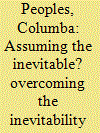

|
|
|
|
|
| Publication |
2008.
|
| Summary/Abstract |
Is armed conflict in and from space inevitable? In recent years a consensus has emerged that space has become increasingly militarized - in the sense that technologies placed in outer space are increasingly used to facilitate and augment traditional military activities. But actual use of weapons in or from outer space remains highly controversial. The aim of this article is to assess the attitudes of major space-faring powers towards space weaponization. Central here, the article argues, is the question of whether the weaponization of space and/or conflict in space (taken here to mean the occurrence of military conflict in outer space itself, or from the Earth directed at any systems deployed in outer space) is inevitable, and the extent to which the major space powers espouse this proposition. This article shows that the idea of inevitability retains a prominent place (although for subtly differing reasons) in American, Chinese, and Russian perspectives on space weaponization. What it is that is inevitable frequently varies, based on assumed but underspecified technological developments. This risks creating a discursively constructed security dilemma that increases the likelihood of actual space weaponization. It leads to the conclusion that renewed negotiations between the major space powers and international cooperative agreements are essential to combat the fatalism of the inevitability thesis.
|
|
|
|
|
|
|
|
|
|
|
|
|
|
|
|
| 2 |
ID:
175554
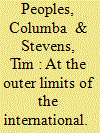

|
|
|
|
|
| Summary/Abstract |
As staples of science fiction, space technologies, much like outer space itself, have often been regarded as being ‘out there’ objects of international security analysis. However, as a growing subset of security scholarship indicates, terrestrial politics and practices are ever more dependent on space technologies and systems. Existing scholarship in ‘astropolitics’ and ‘critical astropolitics’ has tended to concentrate on how such technologies and systems underpin and impact the dynamics of military security, but this article makes the case for wider consideration of ‘orbital infrastructures’ as crucial to conceptions and governance of planetary security in the context of the ‘Anthropocene’. It does so by outlining and analysing in detail Earth Observation (EO) and Near-Earth Object (NEO) detection systems as exemplary cases of technological infrastructures for ‘looking in’ on and ‘looking out’ for forms of planetary insecurity. Drawing on and extending recent theorisations of technopolitics and of Large Technical Systems, we argue that EO and NEO technologies illustrate, in distinct ways, the extent to which orbital infrastructures should be considered not only part of the fabric of contemporary international security but as particularly significant within and even emblematic of the technopolitics of planetary (in)security.
|
|
|
|
|
|
|
|
|
|
|
|
|
|
|
|
| 3 |
ID:
102461
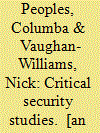

|
|
|
|
|
| Publication |
London, Routeldge, 2010.
|
| Description |
vii, 182p.
|
| Standard Number |
9780415484442
|
|
|
|
|
|
|
|
|
|
|
|
Copies: C:1/I:0,R:0,Q:0
Circulation
| Accession# | Call# | Current Location | Status | Policy | Location |
| 055853 | 355.033/PEO 055853 | Main | On Shelf | General | |
|
|
|
|
| 4 |
ID:
098825
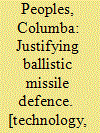

|
|
|
|
|
| Publication |
Cambridge, Cambridge University Press, 2010.
|
| Description |
xi, 299p.
|
| Standard Number |
9780521130417pbk
|
|
|
|
|
|
|
|
|
|
|
|
Copies: C:1/I:0,R:0,Q:0
Circulation
| Accession# | Call# | Current Location | Status | Policy | Location |
| 055211 | 358.1/PEO 055211 | Main | On Shelf | General | |
|
|
|
|
| 5 |
ID:
074078
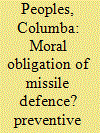

|
|
|
|
|
| Publication |
2006.
|
| Summary/Abstract |
This article aims to assess the moral arguments that have been propounded for missile defence in the post-Cold-War era and to evaluate how these relate to those made for the 'pre-emptive' use of military force. Specific attention is paid to the argument that contemporary missile defence constitutes a form of moral obligation for the United States, a position explicitly advocated by just war theorist James Turner Johnson. Drawing on critiques of similar arguments made in the 1980s, the assumptions of this position are critically assessed. Finally, the article asserts that the general reconfiguration of imminent threats in recent US security strategy gives sustenance to the moral argumentation for missile defence as much as it does the anticipatory use of force more broadly understood, indicating how the two overlap and intersect in this regard.
|
|
|
|
|
|
|
|
|
|
|
|
|
|
|
|
| 6 |
ID:
131251
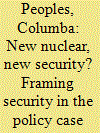

|
|
|
|
|
| Publication |
2014.
|
| Summary/Abstract |
Over the period of the past decade and across successive governments, the case for new nuclear power in the UK has, in policy terms, become embedded as a key facet of UK energy policy. Crucial in this respect, this article argues, has been the framing of the case for nuclear power stations and associated infrastructure in security terms: that is, the case for new nuclear power has come to be articulated and reiterated in direct relation to future energy provision and climate change as key impending 'security challenges' faced by the UK. This article assesses the political significance and effects of framing nuclear power in security terms. In particular, it focuses on how the specific and 'performative' framing of new nuclear power in relation to security has the political effect of narrowly defining and delimiting the ways in which security - and nuclear insecurities - can be articulated and understood.
|
|
|
|
|
|
|
|
|
|
|
|
|
|
|
|
| 7 |
ID:
144065
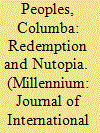

|
|
|
|
|
| Summary/Abstract |
What should the scope of nuclear critique within international studies be? This article addresses that question by making two interrelated arguments. First that political programmes of international nuclear order are crucially underpinned by what is termed here as ‘nutopianism’: a mode of understanding nuclear power that is imbued with a spirit of technological optimism in relation to ‘peaceful’ nuclear power, but simultaneously qualified by an awareness of the destructive uses and catastrophic potentialities of nuclear weapons. Second, that such nutopianism is in turn predicated on the ‘saving power’ of ‘the atom’: the assumption that nuclear power has redeeming features crucial to human progress and economic prosperity, the development of which should be facilitated within the structures of international order. The article makes the case that although critical thought within international studies focuses on nuclear weapons within international order, it has tended to remain largely silent on the issue of ‘civil’ nuclear power beyond nuclear weapons and the complex imbrication between the two. On that basis the article considers whether a more holistic and expansive form of nuclear critique is both possible and necessary.
|
|
|
|
|
|
|
|
|
|
|
|
|
|
|
|
| 8 |
ID:
104997
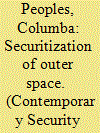

|
|
|
|
|
| Publication |
2011.
|
| Summary/Abstract |
The concepts of militarization and weaponization dominate debates on space security, and radically different implications for arms control follow depending on which of these two characterizations is adopted. Yet the militarization-weaponization debate in many ways fails to capture the vagaries of contemporary space policy. An increasing number of international actors now argue that the infrastructure of modern society - including communications, media, and environmental monitoring - is crucially reliant upon satellite technologies. As a result it is now more accurate to say that outer space is becoming ever more securitized: that is, access to space is now commonly framed as essential to the military, economic, and environmental security of leading states and international organizations. The article illustrates the contribution of a securitization approach in this regard via an analysis of United States and European Union space policy. In the process it argues that attempts at securitization in these space policy discourses maintain an inherent tension between global and national security concerns, and thus provide a weak basis for space arms control. However, in closing the article the author makes the argument that securitization of outer space, if configured around an alternate vision of space security that moves beyond the statist foundations of traditional arms control, can potentially mobilize the political will required for controlling the means of violence in and from outer space.
|
|
|
|
|
|
|
|
|
|
|
|
|
|
|
|
| 9 |
ID:
105642
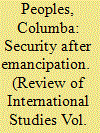

|
|
|
|
|
| Publication |
2011.
|
| Summary/Abstract |
Within the current configuration of Critical Security Studies (CSS) the concept of 'emancipation' is upheld as the keystone of a commitment to transformative change in world politics, but comparatively little is said on the status of violence and resistance within that commitment. As a means of highlighting this relative silence, this article examines the nature of the connection between CSS and the Critical Theory of the Frankfurt School. In particular it disinters the reflections of Herbert Marcuse on the connections between emancipatory change, violence and resistance as a means of interrogating and challenging the definition of 'security as emancipation'. Doing so, it is argued, points towards some of the potential limitations of equating security and emancipation, and provides a provocation of contemporary CSS from within its own cited intellectual and normative foundations.
|
|
|
|
|
|
|
|
|
|
|
|
|
|
|
|
|
|
|
|
|